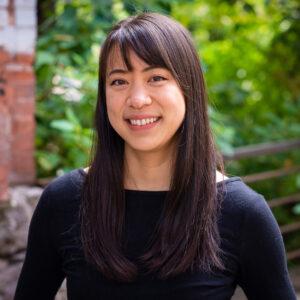
Communications Manager
Chantal Wikstrom cleans the dirt off of a foraged shrimp russula mushroom.
In the second interview of the Place matters: Asian American farming in the Pacific Northwest series, Emilie Chen speaks with Chantal Wikstrom, who is a granddaughter of Cambodian farmers who came to the US as refugees. Chantal reflects on her childhood growing up on a farm and how that has influenced her interest in one day owning a farm.
Photos were taken by Emilie Chen, unless noted.
When starting this project, I naturally reached out to my own networks for connections to possible interviewees. A friend who helped me manage the early stages of this project asked me, “Do you know Chantal [Wikstrom]?” Chantal was someone with whom they had co-hosted a virtual gardening workshop during the pandemic.
Although I didn’t think I initially did, as it turned out, I did know Chantal. She and I met just last year, through another mutual friend—someone I knew from college, with whom Chantal later served in the Peace Corps many years ago.
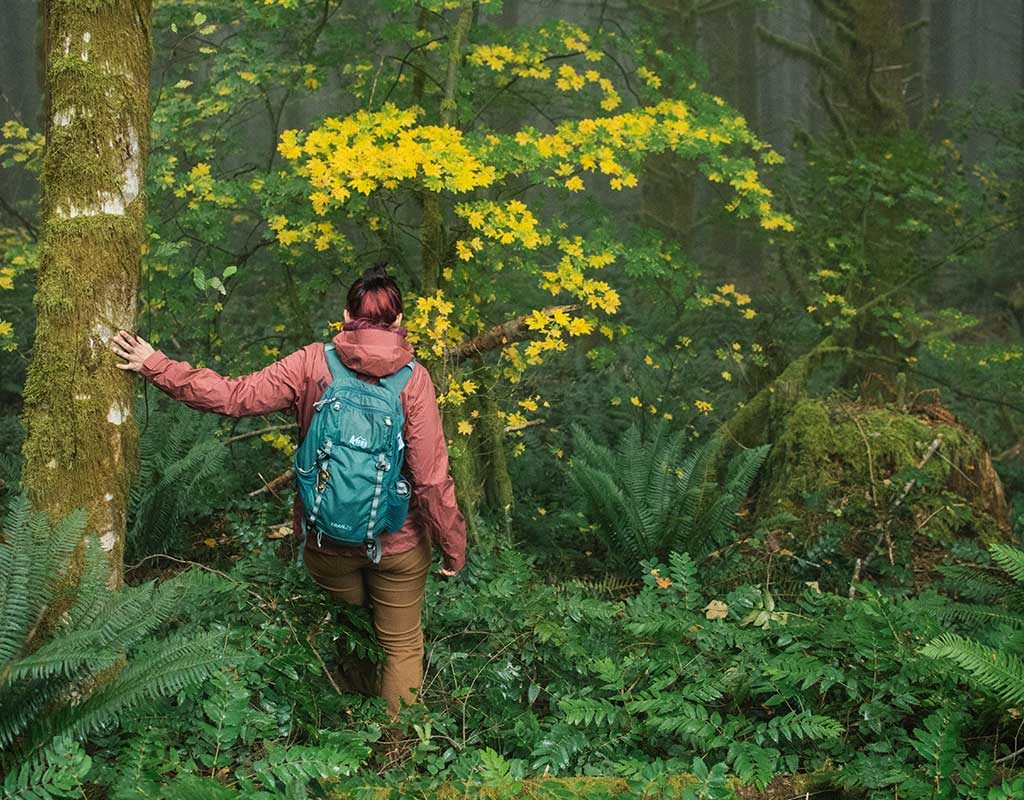
Chantal Wikstrom descends a forested hill in southern Washington.
Both sides of Chantal’s family were farmers, and her interest in gardening and growing food is rooted in her childhood growing up on a farm. Like Pam Oja of Tamura Farms, proximity to animals was one of Chantal’s favorite aspects about farm life: “Especially when there was a new baby alpaca. I would just stay in the barn with them, because I love the babies. They’re so cute and so fluffy.”
Life on a farm was not without hard work. “The most challenging memories were slaughtering some of the animals, especially the rabbits, because they had loud screams. But I was thankful to have meat that we had raised personally,” Chantal reflected, as we chatted around my dining table.
“Another challenging thing was having a lot of responsibilities and not enough time to be able to hang out with friends outside of the farm,” she said. “But it’s also kind of cool, because my friends would come over sometimes, and we’d go hang out with the animals. And I would just give people so many eggs, because we had so many.”
Chantal currently lives in the Portland Metropolitan Area, working full-time for the Oregon Health Authority in a drinking water services program, where she helps manage and regulate public water systems, conduct water system inspections, and coordinate emergency response and preparedness efforts. But her passion for growing food is still expressed in how she spends her free time, which includes gardening, volunteering with a local orchard, and foraging for wild mushrooms, which is how we spent our photo session.
“How did you get into mushroom foraging?” I asked.
“It’s something that I always wanted to get into,” she replied, but she was initially intimidated, especially by the culture of secrecy that some mushroom-foragers maintain around their foraging spots. “But I would visit [one of my friends who lived in Humboldt], and she took me out mushrooming. We went looking for candy caps and king boletes. I think that was my first time mushroom hunting, and I had a blast. …After that, I was hooked.”
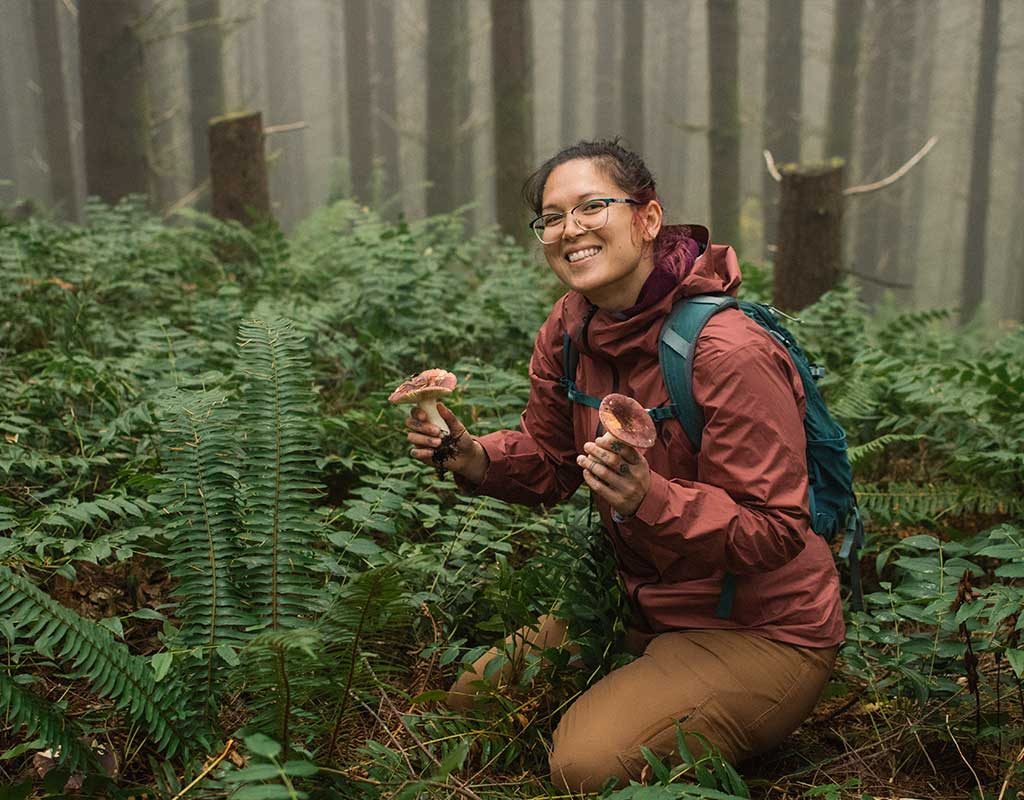
Chantal Wikstrom holds up the shrimp russulas that she has found.
Originally from Washington State, Chantal then lived in California for a while before relocating to Portland in 2019. “I wanted to be closer to home because of some family health issues,” she explained.
Her father, a white American of mostly Swedish descent, grew up in a farming community in Sioux City, Iowa. “One of the only ways you can get out of there is joining the military,” Chantal described. “So that’s what all my uncles did, including my dad. They all joined the Navy.” Initially stationed in South Carolina and later deployed in the Mediterranean, Chantal’s father returned to the U.S. and was stationed at a naval base on the Olympic Peninsula. After being discharged, he went to college for geology in Bellingham, then got a job teaching English as a second language in Seattle.
Chantal’s maternal family arrived in the U.S. from Cambodia, displaced by the Khmer Rouge regime. Khmer Rouge “started as a small communist insurgency… and grew into a terror regime during its rule from April 1975 to January 1979. This resulted in the deaths of an estimated 1.7 million Cambodians through execution, exhaustion, and starvation.” Escaping the inhumane rule of the Khmer Rouge, 158,000 Cambodians came to the U.S. as refugees between 1975 and 1994.
Sponsored by American church programs, Chantal’s grandparents, who were farmers in Cambodia, and their eight kids came to the U.S. in 1985. “They were able to move to Seattle, where a lot of Cambodian immigrants are,” Chantal said. “At first, they were in public housing.”
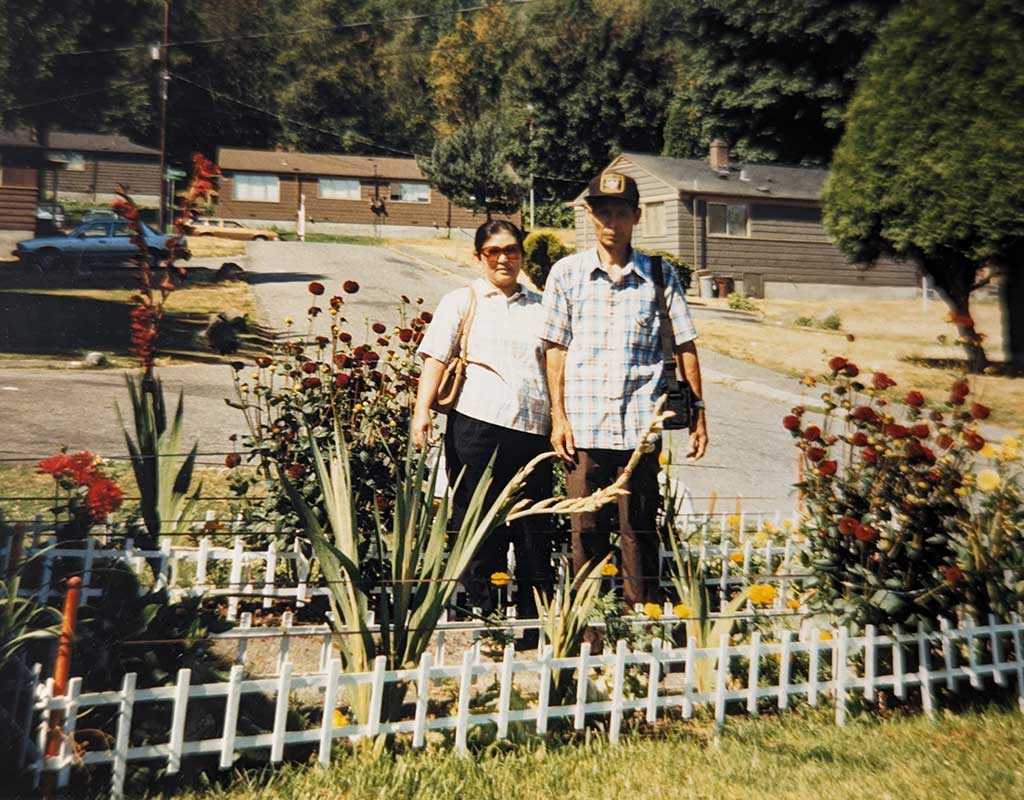
Chantal’s grandparents. Photo courtesy of Chantal Wikstrom.
During this time, her grandfather grew whatever he could, including squash, pumpkin, and flowers, in “buckets and any spare piece of land that wouldn’t get mowed,” Chantal described.
“It was really common for Cambodians back in Cambodia to farm. But coming to America, it was hard to find those kinds of opportunities, because of land access. I think there were some families who were able to get farm labor jobs. For example, when my family came here, my mom and some of my aunts and uncles worked at a berry farm in Overlake,” she elaborated. The barriers that people of color, especially immigrants and refugees, experience in obtaining farm ownership, land access, and federal support programs have been well documented.
During Chantal’s infanthood, her parents moved to Burien, Wash. While still owning and operating a seafood business in West Seattle, her parents began alpaca farming, which had been introduced to them through her father’s friend. “We started out with four alpacas, and then I think our largest herd was about 14 alpacas. It was nice because they paid for my college education,” Chantal recalled. “After the [early 2000s] recession, it was pretty hard. [The alpacas] just weren’t worth any money anymore. Nobody wanted to buy the fiber.”
Later in Chantal’s childhood, her parents were able to purchase a five-acre farm in Kent, Wash. Chantal speculated that her parents were able to make this purchase by selling some of their alpacas and because farm property was relatively affordable at the time, compared to now.
In Kent, the family continued raising alpacas, as well as meat rabbits, chickens, ducks, and geese on a small scale. Chantal’s mother spun alpaca wool and maintained a large berry patch—eating berries was another of Chantal’s favorite childhood memories—and Chantal’s maternal grandfather was able to continue nurturing his passion for growing food.
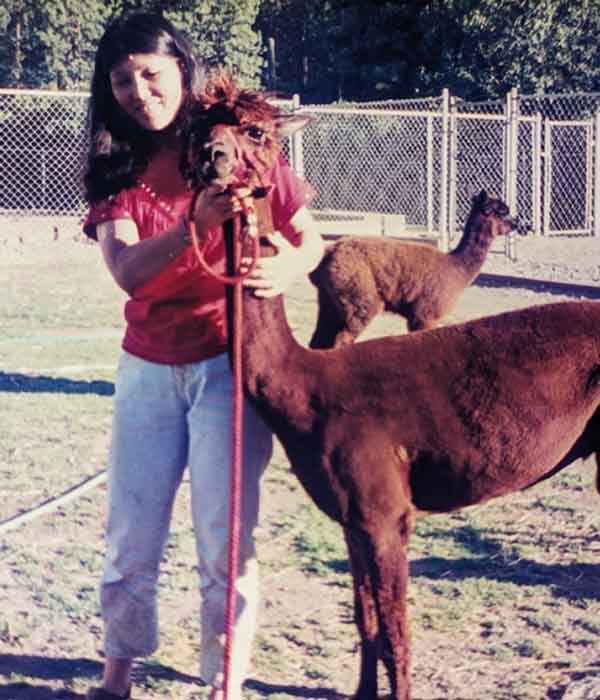
Chantal’s mom with one of her alpacas. Photo courtesy of Chantal Wikstrom.
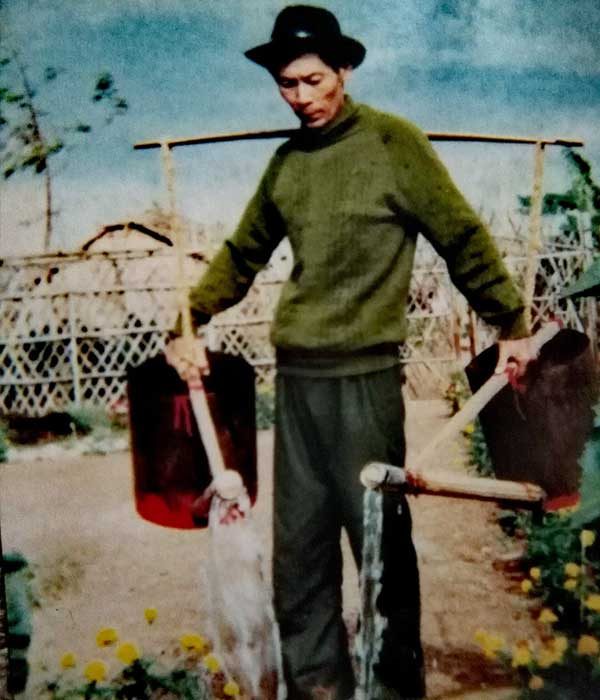
Chantal’s maternal grandfather. Photo courtesy of Chantal Wikstrom.
While Chantal’s father was able to access equipment, like large tractor rentals, it was different for her grandfather. “My grandpa wasn’t really used to the equipment, because in Cambodia, he used water buffalo. Very traditional,” Chantal said. “But after a while, my grandpa learned how to use the tractor and the tiller and stuff. But he still loved to do everything by hand, even though it hurt him. He was just very stubborn that way. …In terms of figuring out what to grow and what worked, he talked with this group of friends in Chinatown.”
Almost daily, Chantal and her grandparents took a bus to Seattle’s Chinatown, which had become a hub for multiple Asian immigrant communities. Chantal’s grandfather would visit his friends and discuss business opportunities, “so I think he got a sense of what grocery stores were looking for and what grew well.” He grew a variety of Asian herbs and vegetables, notably bok choy, ginger, lemongrass, and fish-cheek herb.
Despite their eagerness to grow food, like many immigrants of color, Chantal’s grandparents had difficulty finding work in the U.S. “They were older when they came, and it was really hard for them to learn English. But [my grandfather] was really happy when he first started growing. It was like his extra spending money. He didn’t make a lot of money, but he was so happy.”
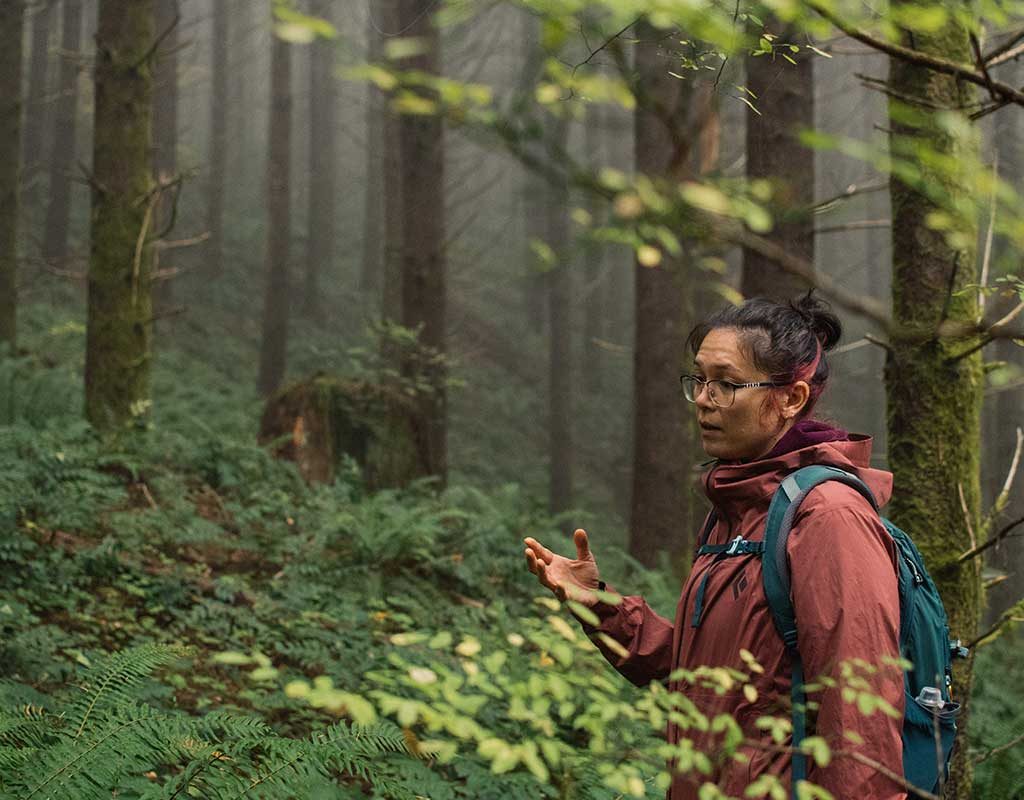
Chantal stops to chat with me while we foraged for mushrooms.
After five years of living in Kent, her father sold the seafood business—“It was just too hard on his body”—and went back to school to get his master’s in education, while her mother continued to help the new owner of the crab business, though she later worked in school nutrition, serving lunches and breakfasts. Although Chantal’s parents are now divorced and no longer farm for a living, they each still retain a strong interest to grow food.
“I think it’s an independence thing,” Chantal observed, “They want to grow their own things. They don’t want to buy it at the store. They like manual labor. They can’t really stay still, even now. And yeah, I think I got that too. Gardening is one of my biggest hobbies and stress relievers.”
“I know that when I was younger, I hated it. Having all these chores, having to scoop up all the poo, all the nasty stuff. I did not enjoy it. But during college, I still got farm labor jobs here and there, because it was like, ‘Well, I know what I can do. I know how to do the work, and I know that I can make money’ … I wanted to manage a farm, but becoming a farm manager in the U.S. is especially hard because farm owners want a lot of farm work experience, and mine was a little bit more untraditional.”
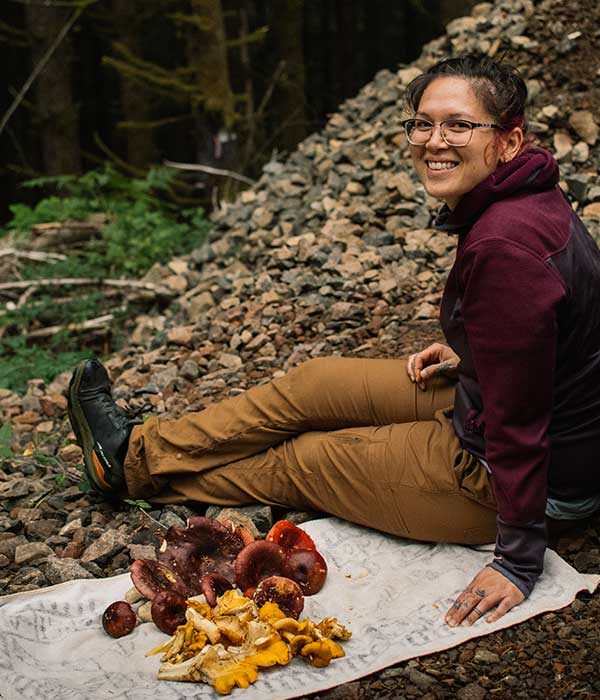
Chantal poses with a haul of foraged mushrooms.
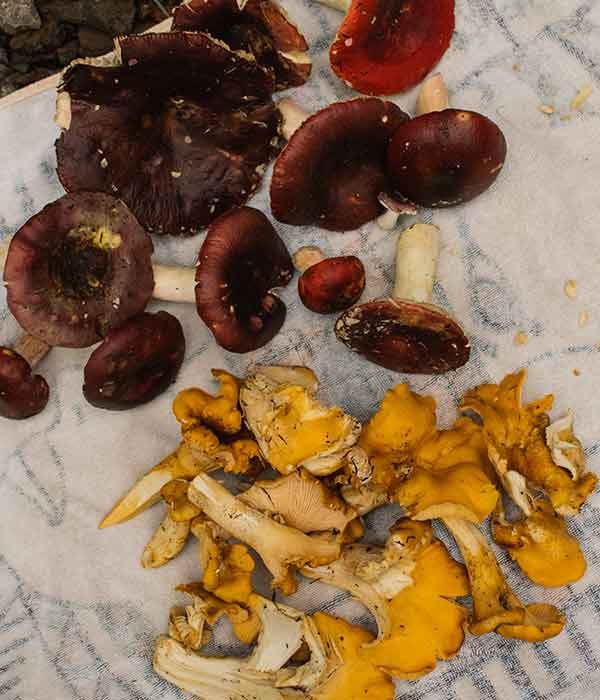
Shrimp russulas and golden chanterelles.
Instead, Chantal has found other ways to work with farms and tap into the knowledge about farming and seafood businesses she has been exposed to since childhood. When serving the Peace Corps in Zambia several years ago, Chantal’s primary work was to teach about fish farming, and she also did a lot of teaching about permaculture. “I helped form a women’s group, like a savings and small banking group. They wanted to raise some animals to help fund projects in the village, so I wrote a grant through Peace Corps [for] broiler chickens.”
After the Peace Corps, Chantal worked in the Napa, Sonoma, and Mendocino Counties of California, developing farm management plans and managing riparian restoration projects on farms. “I would go out and do the site visits with the farm managers, and we would do soil and water quality tests. We would look at all of the drainage and come up with best practices, especially for the water [management], because there were a lot of regulations in California about water quality.”
“Sometimes I still get a little farm envy,” she admitted. “I still have it in my long-term goal to manage or own an orchard, but even if I’m not doing that, I still have other opportunities to do that kind of work. I volunteer at the Home Orchard Education Center in Oregon City where I was a board member, taught workshops, and worked in the orchard. I’ve been helping them with overall orchard management… And my mom has a small plot where her house is on, and there’s some fruit trees that I’ve been working on…I have a few Hugelkultur beds that I’ve made, and I have a rain collection system. So it’s nice I still have some ways to play around.”
“What would your grandparents think about you wanting to start your own farm?” I asked.
“My grandparents died before knowing I wanted to farm on my own,” Chantal reflected. “I think they would have tried to talk me out of it because of the low pay and manual labor, but they would have been proud either way.”
A big thank you to Chantal Wikstrom for your sharing your family’s story.

BLOG
Inspired by the historical contributions of Asian farmers along the West Coast, Communications Manager Emilie Chen explores Asian American farming identity through five interviews.

Blog
A conversation with the fourth-generation owner of Tamura Farms, Pam Oja, highlights the experiences of Japanese legacy farmers in Oregon.